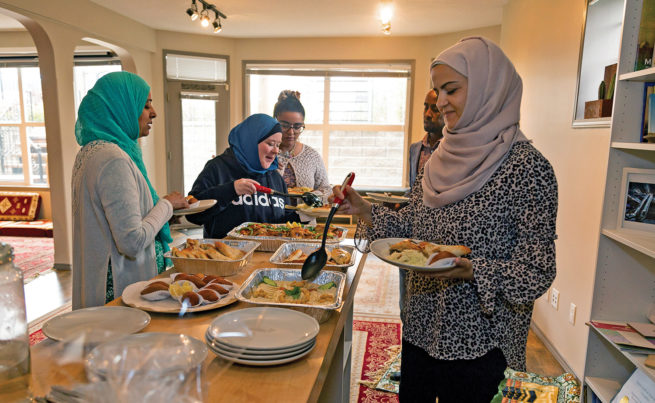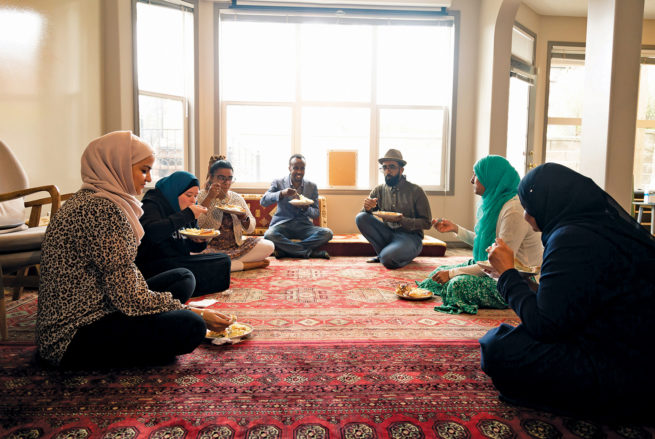October 30, 2020
Social services organization started as a basement food bank
Police found a distressed 72-year-old woman in Sherwood Park earlier this year. She was lost and unable to communicate in English with the officer who found her. She showed the officer her Islamic Family and Social Services Association (IFSSA) client card and they took her to IFSSA’s Belvedere office where staff connected her with their extensive language network, finding someone who could speak with her.
They learned that she was the sole guardian to an orphaned 13-year-old girl, and that she had been trying to find IFSSA to access its food bank, which focuses on providing clients with food adhering to halal Muslim dietary requirements.
After receiving food, hygiene supplies and COVID-19 supports, she was eager to get home. The staff booked the lady a ride home, provided her with food, connected her with essential supports in the community and made sure she would not be socially isolated while physical distancing.

“This story may be unique to COVID times but it highlights the diverse population we normally serve. While we’ve had to adapt our work during COVID, a lot of what we’re doing — and what we did for that woman — is business as usual,” says Omar Yaqub, who works on partnership development at IFSSA.
Halal food hampers are part of the many services IFSSA offers its clients. The hampers focus on staple ingredients including lentils, grains, rice, cooking oil and protein, as well as pasta and cereal. All the food adheres to halal guidelines, which Yaqub says is integral to the identity of many of IFSSA’s clients.
“Food is held very close to who we are and what we do. Muslims have a dietary law. The law is about maintaining the sanctity of food and what comes into our bodies. Muslims believe that what we ingest has a spiritual dimension. This requires us to abstain from certain items and give blessings when we eat,” says Yaqub.
Volunteers painstakingly go through ingredient lists and screen donated goods to ensure surprises like meat by-products or alcohol don’t otherwise sneak into food hampers.
In 1992, IFSSA began primarily as a food bank operating out of a home’s small basement. Over the years, staff positions were added, enabling the organization to do more within the Edmonton community. IFSSA now acts as a holistic service provider, operating out of three different locations with more than 20 staff.
In 2015, IFSSA partnered with the Edmonton Food Bank, which provides staple items such as lentils and gleaned foods to the organization. The partnership enabled IFSSA to serve more individuals within a single month in 2020 than they did for all of 2015.

A year later, Edmonton Community Foundation helped fund the hiring of the organization’s first executive director, further allowing IFSSA to be proactive in addressing issues of food insecurity.
“Now we don’t have to worry about the myriad logistics of sourcing lentils or oil; now we can dedicate more time to working on addressing a client’s other challenges,” says Yaqub.
Those other challenges, lack of employment, affordable housing, social isolation and language barriers, all play a role as root causes of food insecurity, he added.
IFSSA has responded with programs that foster healthy relationships while providing business training, therapeutic support, domestic violence counselling and youth support. When a client comes to access the food bank, there’s an assessment conducted where they can speak about the challenges they are facing.
Then, they’re connected with an outreach worker, the organization’s help-line or external supports. “One of the areas where we’re transitioning is changing the goal of intake from being about assessing eligibility to it being a starting point for a conversation where they set goals, and connect with resources that help them achieve those goals,” says Yaqub. IFSSA is also working to ensure the safety of its clients during the COVID-19 pandemic. The number of families the organization helps has increased by 40 per cent since January, highlighting a drastic increase in food insecurity.
Yaqub has many stories of families that accessed the food bank and saw benefits that go beyond improved food security. Several clients, many Syrian refugees, started their own home cooking business after taking part in one of the IFSSA’s training programs.